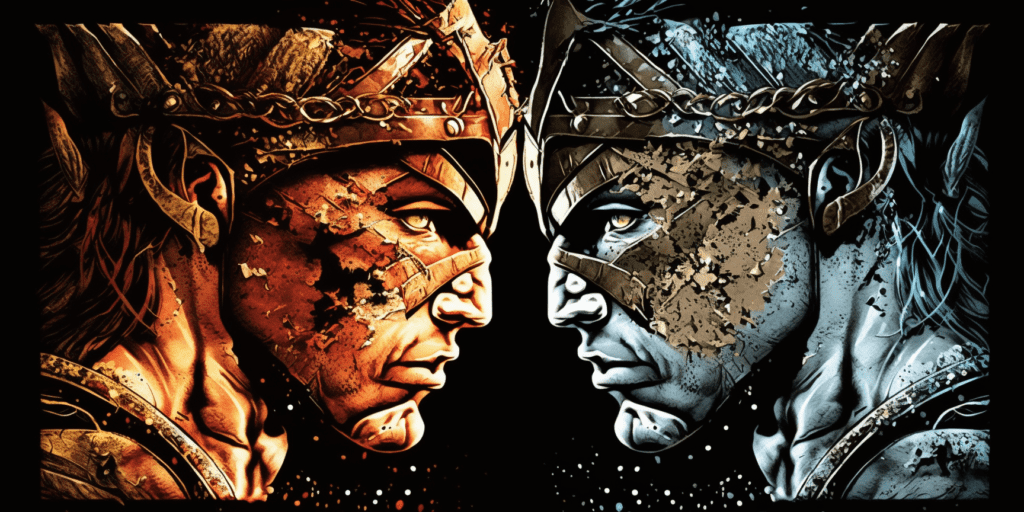The two biggest TTRPGs in the last years are without major contention, DnD and Pathfinder. They have a lot of similarities, both in style and ruleset.
When starting out with TTRPGs, players have a choice: Do I play DnD, or do I play Pathfinder? I’m here to provide you with the differences between the two games so you can figure out what is best for you.
There are quite a few differences between Pathfinder and Dungeons and Dragons. There are mechanical differences, such as the way they approach critical hits, advantage, and the way skills are put together, but also design differences. DnD and Pathfinder differ in how they approach leveling and classes. However, they are both based on the classic D20 roleplaying system.
There’s a lot more to this, so let’s go through it in detail. Keep reading to find out all of the differences between Pathfinder and Dungeons and Dragons!
What’s the Difference Between Pathfinder and DnD?

First of all, it’s worth mentioning that both games have streamlined their rulesets since their inception. Pathfinder changed its system from the old-school DnD 3.5 system, while Wizards of the Coast changed DnD 4e to a more beginner-friendly 5e.
They have branched off into two different directions with quite a lot of differences. First of all, DnD is arguably easier for a person who hasn’t played any TTRPGs. Character creation is a good example of this, where it’s very straightforward in DnD, while Pathfinder character creation demands time and specificity.
Feats
Feats exist in both DnD and Pathfinder, but Pathfinder is more generous in handing them out. In DnD, instead of increasing your stats when reaching certain levels, you can choose to take a feat of your choice.
In Pathfinder, you get feats at certain levels. These feats are based on your character’s background (class, race, and so forth). Moreover, the amount of feats and customization here is much greater than the feat system in DnD.
This can be both good and bad depending on what you like, but it can be argued that the DnD system is easier for beginner players.
Rulesets
I mentioned previously that both DnD and Pathfinder use roleplaying systems that are derived from the classic D20 system. While that is true, they have since then branched off. In general, Pathfinder is slightly more complicated than DnD.
Proficiencies
Proficiencies are present in both DnD and Pathfinder but take different shapes. Proficiencies are used to determine how good you are at taking on various tasks. In DnD, you have a static proficiency bonus that depends on your level. Either you are proficient with/at something, or you aren’t. It’s pretty simple.
However, in Pathfinder, proficiencies are on a scale between 2 and 8, depending on how proficient you are at any given task. Let’s just say that the Pathfinder proficiency system is more sophisticated, and therefore more complicated.
Advantage and Disadvantage
Both DnD and Pathfinder include the disadvantage/advantage mechanic. This mechanic involves giving you good or bad conditions before an ability check, attack roll, or saving throw.
For example, if you attempt to pick a lock on a door and the lighting is very good, you may get an advantage on that ability check. However, if the lighting is poor, you may get a disadvantage.
In DnD, a roll with an advantage is done by rolling two dice and taking the highest of the two, and a disadvantage is rolling two dice and taking the lowest out of the two.
In the lockpicking example, the lockpicker has to pass a difficulty class of, say 15, to unlock the door. Luckily for him, the lighting is really good and he gets an advantage on his ability check. He rolls two d20 dice and compares the highest number of those rolls with the required 15 DC.
In Pathfinder, advantages and disadvantages work differently. In fact, they don’t even use the two terms. Instead, you get circumstantial bonuses based on different stats, abilities, feats, and so forth. It’s not as complicated as it may seem, but it’s not as simple as in DnD.
Crits
Critical successes and failures also differ between Pathfinder and DnD. In DnD, critical success is when you roll a 20 on a d20, and critical failure is when you roll a 1 on a d20.
Pathfinder takes another approach to this. When you roll 10 above a target’s AC, you get critical success, and when you roll 10 under a target’s AC, you get critical failure. I like both games’ approaches to crits, quite frankly, and both are fairly straightforward.
Other mechanics
In DnD combat, you can move a distance up to your speed, and take one action (and a bonus action if you have one available). The action you get can include attacking, casting a spell, disengaging, dashing, and more.
In Pathfinder combat, everything is counted in actions. For example, movement is an action, attacking is an action, and casting a spell is often multiple actions. However, you have three total actions to play with. This system was introduced in Pathfinder 2e and has been received quite positively.
Design Choices
The character customization options are a lot more varied in Pathfinder. This goes for both character creation and progression. For example, you get to pick abilities at nearly every level and the freedom with which you can steer your character is great.
Remember however that this freedom and an array of options come with complexity. DnD has streamlined its system for a reason – to make it easier for new players to learn the game.
The design choices DnD and Pathfinder are different. In Pathfinder, magic items and cool loot is given out far more often than in DnD. Since this is the case, there is a more diverse set of items and weapons in Pathfinder than in DnD.
Personally, I prefer the way DnD does it. They hand out magic items sparingly so it really has an impact when it happens.
There are more differences between the two games, of course, but the ones I’ve listed above are the biggest ones. Overall, both games are great, and I really recommend trying Pathfinder if you haven’t already. The game has a smaller player base than DnD, but if you can find willing players, go for it.
Is Pathfinder Harder Than DnD?

I listed the main differences between DnD and Pathfinder in the text above, and as you saw, there are major differences between the two titles. However, is Pathfinder a harder game than DnD?
Pathfinder hasn’t streamlined their game as much as DnD, so it’s certainly more complex and involves more numbers. That doesn’t necessarily make it harder, however, but the learning curve might be a bit steeper.
I mentioned earlier that Pathfinder has a lot more rules and options than DnD regarding character creation and progression. While this is great, it makes the game harder for some people. Some users found that they spent more time with their noses in rulebooks with Pathfinder than actually playing the game.
In summary: Pathfinder involves more math and numbers and customization, but in doing this, the game can get a bit too bogged down in rules and min-maxing for some people who want to spend less time with skill points and more time roleplaying.
Is Pathfinder More Popular Than DnD?
DnD is without any meaningful competition, the biggest TTRPG n the world. In terms of search queries on Google, DnD had around 500,000 in 2021 while Pathfinder had around 40,000. If you want to read more about this, I recommend checking out this resource.
Why is this? Well, first of all, DnD is very well-known in popular culture, and therefore the face of tabletop RPGs. Whenever people want to try TTRPGs, they look to DnD.
Furthermore, WotC has designed a very beginner-friendly RPG system that can be easily learned and played by newcomers. People have mistakenly believed that Pathfinder is more popular than DnD 5e, but that is simply false. It did outsell DnD 4e for a short while, but that was most likely because DnD 4e was deeply flawed.
Overall, DnD is still the most successful and streamlined tabletop RPG on the market.
Should I Play Pathfinder Or DnD?

Whether you should play Pathfinder or DnD is a matter of taste and opinion. If you’re completely new to TTRPGs, my recommendation would be to try DnD first. As I’ve mentioned a couple of times, it’s the easier game to get into of the two.
It might be hard(er) to find players for Pathfinder than DnD since DnD is a lot more popular. It all depends on where you live. If you live in a major city in the U.S. then you’ll probably have no problems finding players for Pathfinder.
If you really enjoy character customization and deep diving, you should try Pathfinder. Some people feel that DnD lacks a bit in character depth and options, and if you feel that way, Pathfinder should be your go-to.
